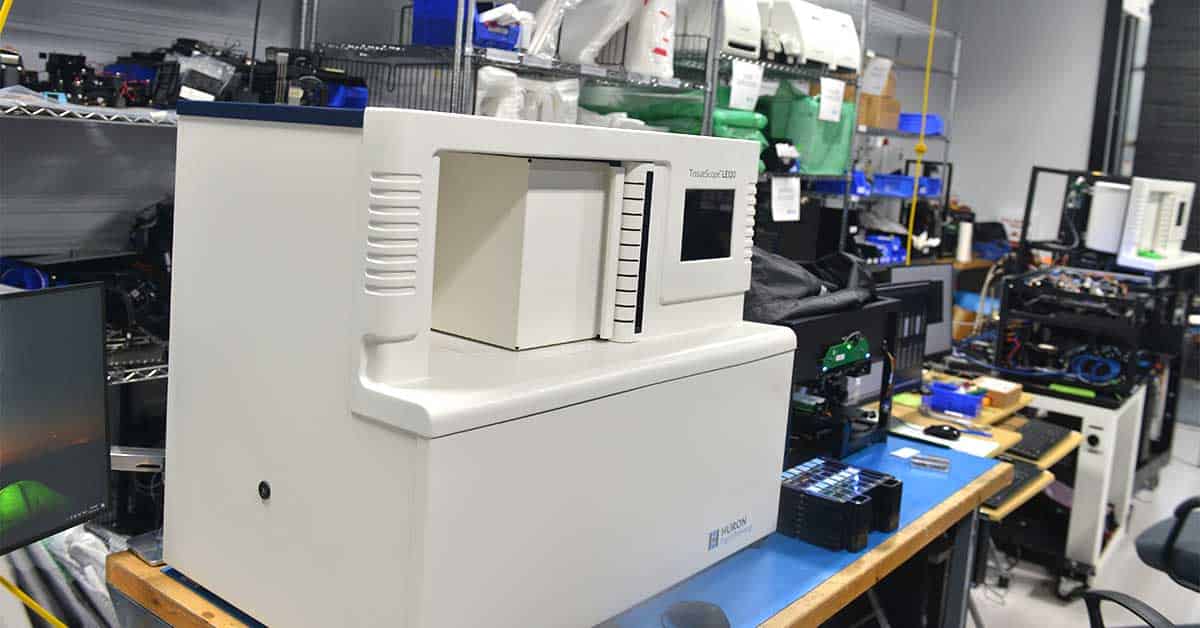A St. Jacobs business last week received a $1-million repayable loan under FedDev Ontario’s Business Scale-up and Productivity stream.
The no-interest loan to Huron Digital Pathology will help lead the expansion of the company’s manufacturing, and allow them to add 11 more employees.
Founded in 1994, the company develops scanning instruments that are used in imaging microscope slides for pathology.
“Say you get a biopsy or a researcher has a piece of tissue that they want to do research on, they process that tissue and eventually it finds its way onto a microscope slide. And then they look at it under a microscope to do their research or make a diagnosis. So that’s the traditional way and that’s the way that it’s done in the majority of labs today. Whereas the other disciplines have gone digital like Xrays in radiology, they no longer have the big pieces of film. It’s all digital,” explained company president Audil Virk.
Developing this type of technology comes with a lot of barriers, which means pathology lags behind other medical areas.
“The images that we generate from scanners require a lot of memory and a lot of computing power to do so. Whereas in radiology, you could just snap an image. In pathology, a lot of technology has to be developed in order to image it at the same resolution as if you’re looking through a microscope,” Virk explained of the challenges.
There are several advantages to this technology, Virk noted. That includes improving diagnostics by making it faster and more accurate.
“One is that the image analysis algorithms can assist the pathologist. But because it’s an image, now it can be viewed from any pathologist anywhere in the world. You’re not just stuck with your local hospital, you can access any pathologist in the world and patients can get access to their own images and get second opinions and things of that nature.”
The technology also uses artificial intelligence to store images, which will allow pathologists and other medical professionals to compare current cases to older ones.
“Let’s say a pathologist gets a new case, the image-analysis algorithm we’re developing can compare the new image with the older cases, and then display it to the pathologist. That way, if they’re having difficulty diagnosing the case, they can compare it against all of the previous cases and the outcomes actually for the patient, based upon whatever medicine they prescribed,” Virk said.
The loan will see Huron grow significantly.
“Huron has been doing this for a while, but now it’s really starting to take off and we can’t keep up in manufacturing the scanners. And so with the funding, we’re going to be doubling the size of our facility, and probably more than doubling the size of the manufacturing so that we can produce more systems and faster.”
Dany Mercado, a manufacturing supervisor at Huron, highlights the growth of the company he has been working with for the last 10 years.
“We’ve gone from a single slide holder… to now being capable of doing from 12 slides to 120 and now to 400,” he explained.
“I’m a cancer survivor and to be able to help with these systems and push these systems to get them to the hospitals and clinics in pathology labs to be able to make a difference with cancer research. It’s absolutely amazing that we’re able to do that,” Mercado added.
The pandemic has highlighted the need for both the production of medical equipment in Canada, and the move to make pathology digital, Virk said.
“We’re the only Canadian company doing this, and we’re going up against major international players in the medical field, so [the loan] is a way to scale our growth,” he added.









